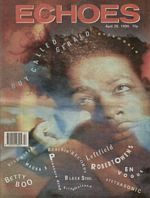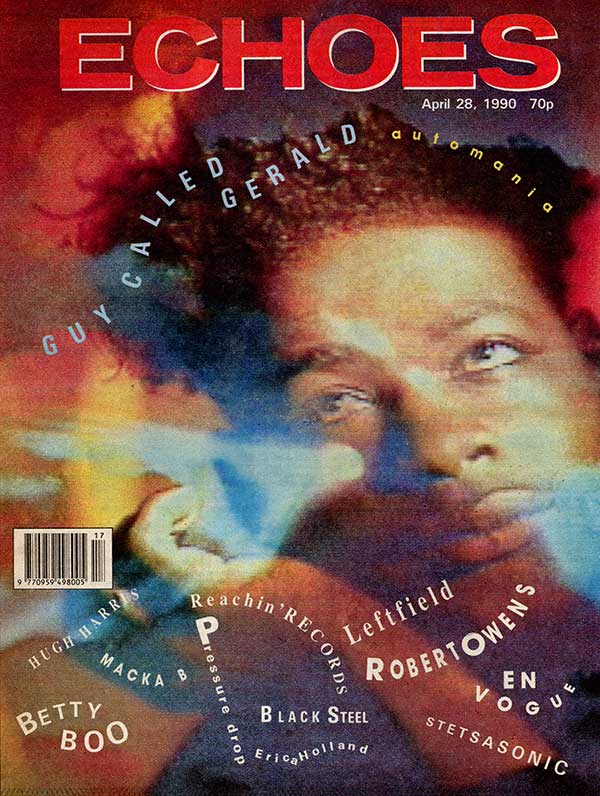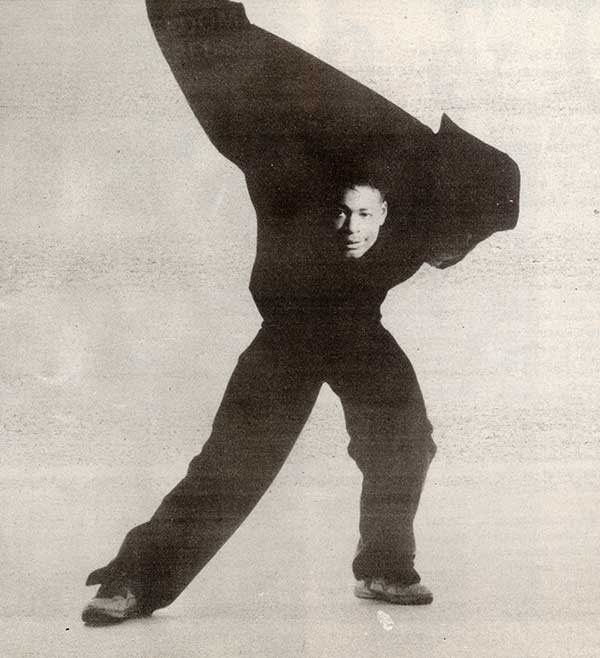| GUY FORKS | |
 |
Echoes 28 April 1990 Page: 7 |
 There's this guy called Gerald, see, an' he makes house music, see. An' Tony Herrington braved the Manchester rain for a word in his shell-like, like. ELEVEN O'CLOCK on a rain-soaked April morning and I am sitting in the first floor cafe of a central Manchester cinema complex waiting for A Guy Called Gerald. It's not the most obvious time or location to interview someone whose life and work are so inexorably bound up in the pop-eyed, small hours euphoria of the nation's club milieu, and clearly Gerald feels the same way. "I overslept," he says sheepishly when he eventually turns up some 49, minutes late. We haven't met before, despite the tact that we live within shouting distance of each other in the same area of South Manchester, but I can recognise him by the black Kangol cap and that curiously vague expression which seems to suggest an ongoing bemusement with the ways of the world. "I'm knackered," says Gerald sitting down at table. "I was up real late last night." As it turns out he has been oversleeping quite a lot lately, due to the fact that, currently, he is having to involve himself in that area of contemporary dance music which gives, him the least satisfaction; namely, the club PA. "I hate them," he says bluntly. "They put me under too much pressure. When I was playing live 1 could relax because I was in control of the music. With a PA it's just miming. You're standing there and you can't do anything. I can't handle that. I missed the first one on purpose. Just disappeared. Seriously. It's that bad." Gerald is an international, major label recording artist now, signed to CBS via his own Subscape dance subsidiary and attached to the same management company as Halo James. By the time you read this he will have a new album, and single in the shops, both selling under the title 'Automanikk'. And here is the reason why he is partaking in such an abhorrent procedure as club promotion: "It's so the record company can sell more records," he says matter-of-factly. "What I wanted to do was to get a massive rig, go on the road, into the clubs and just jam out live. But they said, 'you can't do that, you've got records to promote, the clubs haven't got the right facilities'." He shakes his head in exasperation. "If they haven't got the right facilities then why go there? Why not go somewhere else?"  In spite of all this, Gerald maintains he knew what he was getting into when he signed the deal with CBS. Perversely, he also goes along with the theory that with their corporate attitudes, labyrinthine infrastructures and long-term release schedules, major record companies seem ill-equipped to deal with the transient, day-to-day, hills in such errant, underground music as house and hip hop. "It's ages since I did the tracks for 'Automanikk'," says Gerald, "but they're only just being released. They don't realise that this kind of music is instantaneous. It needs to be out as soon as it's finished. Its lifespan is very short, something else comes along and suddenly everything's moved on. Like the other day I put some stuff down on tape and it was totally different to the album. But the record company are going, 'the artwork isn't ready', or, 'the PAs aren't set up'. Artwork? What's wrong with a black cover with a name on it?" Gerald might be less than satisfied with the way CBS are handling his music but was it any different before? For instance, he maintains that his previous record company, the Liverpool based independent Rham, released several unauthorised mixes of 'Voodoo Ray' after the single went top five with a bullet last summer and to date they still haven't paid him for the record's initial sales, he alleges. In addition, by constantly putting back the official release of the subsequent 'Hot Lemonade' album, he claims they effectively killed its chances of emulating 'Voodoo Ray' 's remarkable climb up the charts. Then there's the very public falling out with the members of 808 State over the extent of his input on the group's 'Pacific State' single, with Gerald now claiming 100 per cent royalties. Both cases are currently heading for the courts so he's keeping a relatively tight lip on them for now, but it's hard not to sympathise with him when he says, "the sooner I get shot of the music industry the better. Seriously. It's pure hassle." In between severing his links with Rham and 808 State and picking up the pieces of his solo career with CBS and 'Automanikk', Gerald occupied himself by doing remix work for Cabaret Voltaire and The Turntable Orchestra, as well as producing tracks for Mancunian folk eccentric Edward Barton, Trevor Miller's post-acid novel Trip City and, under the pseudonym Ricky Rouge, collaborating with Hacienda DI and deConstruction Records boss Mike Pickering on T-Coy's 'Dream 17'. More significantly perhaps, he found time to make a pilgrimage to Detroit where he got to worship at the altars of Juan Atkins' Derrick May and Kevin Saunderson. "I want to go hack and live there," he says with a rare show of enthusiasm. " What I want to do here is happening over there. There's a lot of integration. Everyone works with everyone else. There's no egos- Musically, someone like Juan will have these really heavy dance tracks, and then to contrast that he'll have what I call nearly classical music using really soft chords and cymbal sounds - its very calming music. When I heard those together it reminded me of what I was trying to do on the album; just make contrasts, use different moods." As far as 'Automanikk' itself is concerned, Gerald sees it serving as a springboard to a brave new world of concerted musical expansion and development. "I wanted to get away from standard house music," he says. "I tried to find a different approach for each track and follow it through. What I would have expressed in samples or sounds in the past has now been put into words. Compared to the old stuff it's heavily vocalised. It’s like the end of the 'Voodoo Ray' sound and the beginning of something new. "But it could still he taken a lot further. The things you can do now with the right technology are amazing. I used to be restricted by just having one drum machine and a keyboard. Now as tar as creativity goes there are no limits. Anything's possible. This is just the start, you know what I mean?" [Author: Tony Herrington] |
|